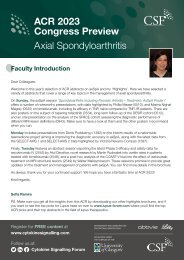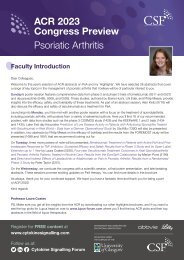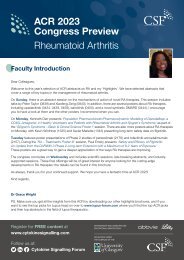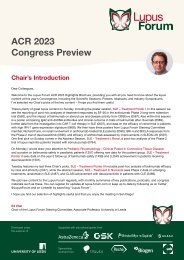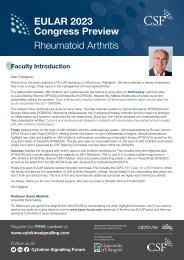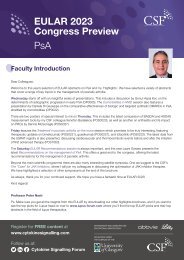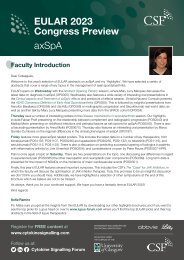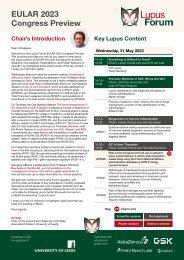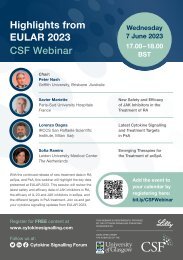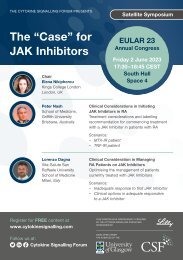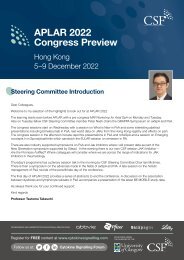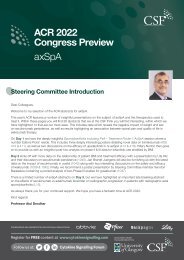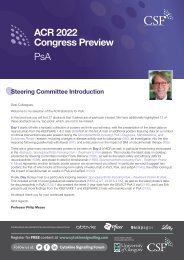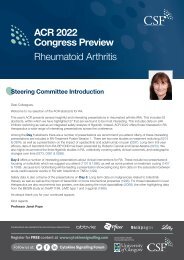ACR Congress Review 2019
Create successful ePaper yourself
Turn your PDF publications into a flip-book with our unique Google optimized e-Paper software.
corticosteroids, and different classes of DMARDs on filgotinib efficacy as measured by <strong>ACR</strong>20 and<br />
DAS28(CRP). Of the 448 patients randomised and treated at baseline, 80.4% were female with a mean<br />
age of 56 years and a mean RA duration of 12.4 years. Benefits were observed for filgotinib across<br />
subgroups. Notably, there was an absence of impact of disease duration, seropositivity, disease activity<br />
and concurrent medication use, on the effectiveness of filgotinib [504].<br />
Genovese et al. evaluated the efficacy of filgotinib in FINCH2 based on number and mechanism of<br />
action (MOA) of prior biologics. Prior bDMARD exposure, including the total number and MOA, was well<br />
balanced amongst the 3 treatment arms. Compared with placebo, filgotinib demonstrated improved<br />
clinical outcomes in bDMARD refractory patients. The efficacy observed with filgotinib was maintained<br />
with no significant effects based on the number and MOA of prior bDMARD use, including in patients<br />
with prior exposure to IL-6 inhibitors [517].<br />
A third analysis of FINCH2, which investigated the extent of anaemia, thrombocytopenia and leukopenia,<br />
was also presented by Genovese and colleagues. Overall, haemoglobin levels, platelet, lymphocyte and<br />
neutrophil counts remained consistent throughout the study. At baseline, 28.8%, 0.9%, 2.2% and 5.8%<br />
patients had mild-moderate low levels of haemoglobin, platelet, neutrophil and lymphocyte, respectively,<br />
and 1.1% had severely low levels of lymphocytes. Of the patients with mild-moderate haemoglobin<br />
levels at baseline, 13.1% with filgotinib 200 mg, 9.5% with filgotinib 100 mg, and 7.6% with placebo<br />
achieved normal haemoglobin at Week 24. All patients with baseline mild-moderate low platelets and<br />
neutrophils had normal levels at Week 24, except for one patient with mild neutropenia receiving<br />
filgotinib 100 mg. Of the patients with normal platelet and neutrophil levels at baseline, >94% maintained<br />
normal levels at Week 24 in all treatment groups. The authors summarised that most patients with<br />
normal haemoglobin, platelet, lymphocyte and neutrophil levels at baseline maintained them over 24<br />
weeks of filgotinib treatment. Overall, the results suggest that filgotinib does not increase the incidence<br />
of anaemia, thrombocytopenia or leukopenia in patients who entered the study with active RA despite<br />
prior biologic therapies [2875].<br />
Modulation of disease-associated cytokines with filgotinib<br />
Taylor and colleagues presented three analyses of disease-associated cytokines in the FINCH2 study.<br />
Cytokine profiles were compared with those of 50 demographically matched healthy volunteers in a<br />
transcriptomic and proteomic study of serum samples from 449 patients. Among 28 cytokines evaluated<br />
in baseline RA serum, 18 were significantly different from healthy volunteers. Of these, CXCL13, CCL2,<br />
CCL3, CCL4, IL-18 and osteocalcin reversed toward healthy volunteer phenotype after filgotinib<br />
treatment, whereas only IL-18 reached healthy volunteer levels in placebo-treated patients. The baseline<br />
transcriptional profile of RA patients was enriched with pathways implicated in RA pathology, including<br />
inflammatory responses and IFN, IL-6, TNFα signalling. Reversal of transcriptional profiles was broadly<br />
dose- and time-dependent, with fewer genes differentially expressed from healthy volunteers after 12<br />
weeks of filgotinib versus placebo. In summary, differences in the peripheral molecular profile were<br />
observed between bDMARD-experienced RA patients and healthy volunteers. While an overall trend<br />
toward the non-diseased molecular profile was observed following filgotinib, only a subset of cytokines<br />
and pathways were statistically indistinguishable from healthy volunteers after 12 weeks [45].<br />
Data from a longitudinal study of cytokines in blood and urine samples from FINCH2 RA patients were<br />
also presented. Comparing filgotinib 100 mg to placebo, high baseline serum levels of CCL3, CXCL10,<br />
IL-5, IL-6, IL-18, MMP3, SAA and VCAM1 were individually associated with improved <strong>ACR</strong> response or<br />
reduction in RA activity (DAS28-CRP) at Week 12. High baseline serum CRP, CXCL13 and VEGFA<br />
levels were also associated with improved response to filgotinib 200 mg. In placebo-treated patients, a<br />
low sICAM1/CXCL13 ratio led to a lower <strong>ACR</strong>50 response rate than those with a high ratio. In contrast,<br />
in filgotinib-treated patients, a low sICAM1/CXCL13 ratio led to an improved <strong>ACR</strong>50 response.<br />
*Chairman’s Pick



